Humane Society International
Issue Type: Dog Meat Trade
Owner Mr Hiep works with Humane Society International in Viet Nam to exit the trade and save 18 remaining dogs for adoption
Humane Society International
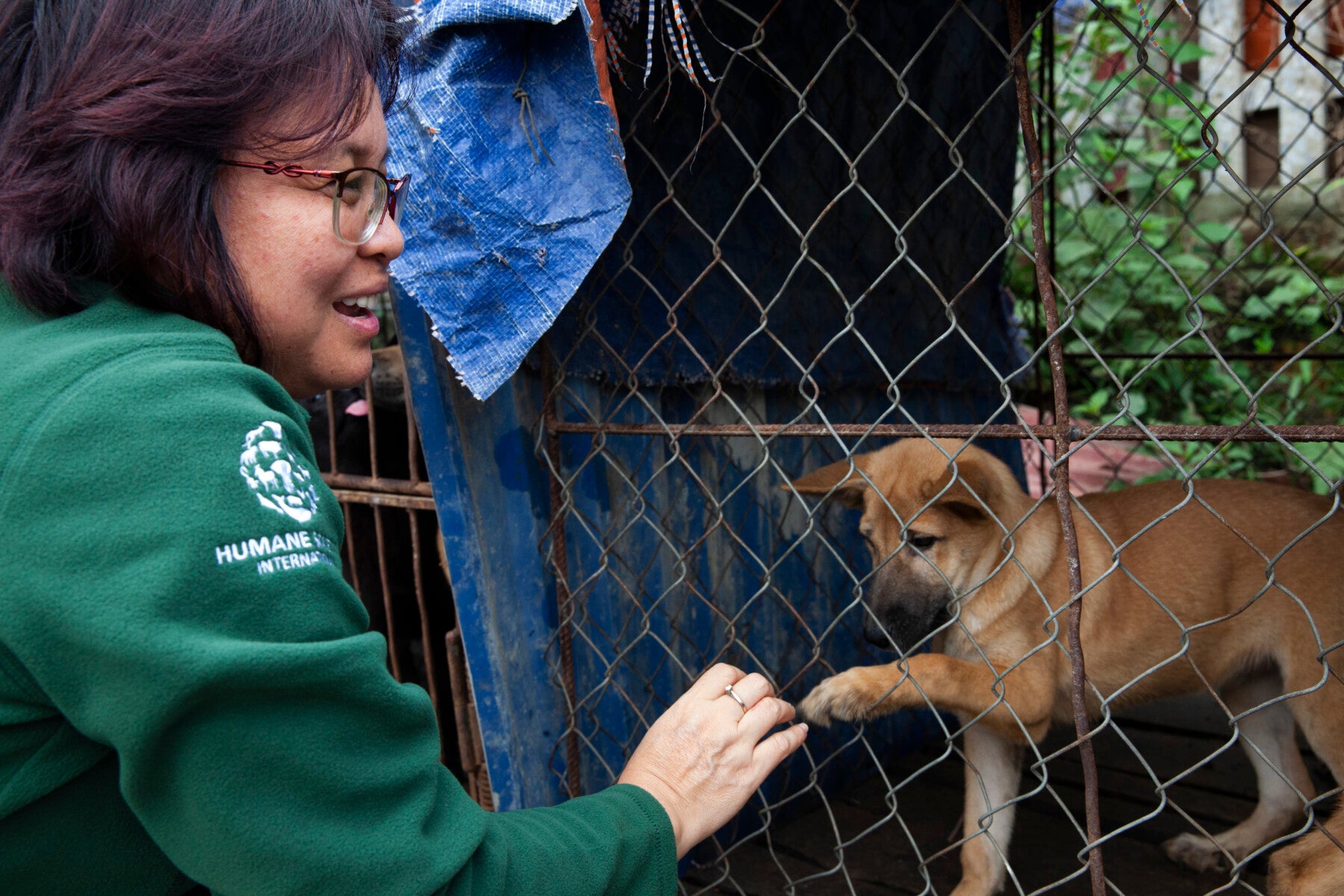
HANOI, Viet Nam—The owner of a dog slaughterhouse and dog meat restaurant in Viet Nam, which killed thousands of dogs for human consumption over the past five years, has become the first in the country to take part in a new Models for Change program by animal protection group Humane Society International. The program helps people transition out of the cruel and dangerous dog meat trade.
Forty-year-old Mr Hiep of Thai Nguyen province—a dog meat hotspot—was eager to work with HSI’s team in Viet Nam to permanently close his dog meat business and stop slaughtering dogs, because he believes killing the animals brought his family bad luck. His business was responsible for killing an average of 10-15 dogs every day. HSI and officials from the Departments of Agriculture and of Animal Health were on site to help Mr Hiep close down his slaughter operation and rescue 18 dogs found alive at the property.
HSI’s Models for Change program is coming to Viet Nam after successfully operating in South Korea since 2015, where the HSI has closed down 17 dog meat farms so far, rescuing more than 2,500 dogs and helping dog farmers transition to more sustainable livelihoods such as chili or water parsley growing.
As well as tackling the tremendous animal cruelty associated with the capture, trafficking and slaughter of an estimated five million dogs a year for human consumption across Viet Nam, HSI’s Models for Change program will also provide workers with a way out of a trade that is known to facilitate the spread of the deadly rabies virus in Viet Nam. Rabies kills more than 70 people in Viet Nam each year, according to the World Health Organization, with most cases caused by dog bites, and several verified cases linked to dog slaughter and even dog meat consumption. Last month, authorities in Hanoi reported the death of a man who contracted rabies after slaughtering dogs for meat.
Phuong Tham, Humane Society International’s country director in Viet Nam, said: “We are very proud to bring our Models for Change program to Viet Nam. The dog meat trade is not only unbelievably cruel, but also poses a very grave risk to human health from the transmission of potentially lethal diseases like rabies. Mr Hiep is the first of what we hope will be many more people to leave this dangerous trade behind them, helping the government achieve its goal of eliminating human rabies deaths from dog interactions by 2030. We recognize that many people involved in the dog meat trade are keen to leave due to low profitability, societal and family shame as well as fears of bad karma. We hope our Vietnamese Models for Change program will become a key component of Viet Nam’s strategy to provide industry workers with alternative and economically viable livelihoods, whilst also supporting the government in its efforts to eliminate rabies.”
The 18 dogs rescued, some of whom had been locked up in cages for fattening to reach slaughter weight, were vaccinated against rabies and distemper, and moved to a nearby HSI-supported, temporary care and rehabilitation facility at the Thai Nguyen University of Agriculture and Forestry, to receive necessary medical care before being considered for local and international adoption. Mr Hiep plans to transform his business to sell agricultural services such as crop fertilizer, as well as groceries, green tea, beer and snacks to waiting customers.
Mr Hiep said: “I know in my heart that killing and eating dogs is wrong, and it was becoming harder and harder for me to do it. I am convinced that being part of this trade was bringing my family bad karma, so I am relieved to work with HSI in Viet Nam to end this chapter in my life and start afresh. The risk of spreading rabies through the dog meat trade is something we should all take very seriously, so I feel proud to be standing up for change in my community, and happy to know that the dogs who have been saved will be able to live new lives with families. It’s a good outcome for me, the dogs and my community.”
HSI conducted research in Thai Nguyen and Hanoi to establish that Viet Nam’s dog meat trade is largely supplied through snatching dogs from the streets or stealing pets from private homes. Traders frequently use poison bait such as meatballs laced with cyanide, and catch the dogs using painful taser guns and pincers. Pet theft and the arrest of pet thieves is frequently reported in the Vietnamese media, and devastated pet owners often buy back their beloved companions if they are fortunate enough to locate them after capture. Traders also go village to village by motorbike to purchase dogs from rural communities that occasionally sell “excess” dogs for extra income. Once there is a sufficient number of dogs to fill a truck, they are tightly packed into small cages and driven for hours or even days, many sustaining injuries as well as enduring exhaustion, dehydration, suffocation, heatstroke and even death before the truck reaches its final destination – a slaughterhouse, market or restaurant.
The link between rabies transmission and the dog meat trade has been well established by the World Health Organization, and the virus’s elimination is undermined by continued dog meat trade activities. Studies by the National Institute of Hygiene and Epidemiology demonstrate that a significant percentage of patients in Viet Nam who become infected with the virus after contact with dogs, do so not due to a bite but after killing, butchering or eating dogs. The link between rabies and the dog meat trade is so well established that in 2018 and 2019, authorities in major cities such as Hanoi and Ho Chi Minh City urged citizens not to consume dog meat to reduce the risk of disease transmission.
Dr. Phan Thi Hong Phuc, dean of animal science and veterinary faculty at Thai Nguyen University of Agriculture and Forestry, said: “Rabies is endemic in Viet Nam, and the dog meat trade is a contributing factor to the spread of this virus to humans. So, we are very pleased to work with HSI in Viet Nam on Models For Change, a first-of-its kind program for our country demonstrating how dog meat trade workers can transition to better, safer livelihoods.”
Dog meat facts:
- Viet Nam kills more dogs for meat than any other country in Southeast Asia.
- While the sale and consumption of dog meat is not illegal in Viet Nam, the unregulated trans-provincial movement of dogs has been illegal since 2009, and pet theft was made a punishable offence in 2016. While several cities including Hanoi and Hoi An have pledged to end the trade, enforcement of laws is rare and trucks continue to openly transport hundreds of dogs at a time on national highways.
- Unlike most other countries across Asia where the majority of citizens don’t eat dog meat, in Viet Nam dog meat —known as thịt chó— remains more popular, and is the go-to dish for special occasions. One recent study of dog meat consumption found that 11% of people in Hanoi and 1.5% of people in Ho Chi Minh City, regularly consume dog meat (at least once/month on average).
- A belief by some consumers persists—despite no scientific evidence—that dog meat has medicinal properties and can increase male virility.
- Dogs are usually killed with a knife to the jugular and heart, in full view of other dogs.
- A 2016-2017 study of dog brain samples from Hanoi slaughterhouses commissioned by Asia Canine Protection Alliance (of which HSI is a member) in partnership with Viet Nam’s National Center for Veterinary Diagnosis showed that one in every 100 dogs had been infected with rabies, which is a high incidence rate.
- Academic papers published in 2008 and 2011 are among those that establish the connection between the dog meat trade and rabies. Detailed references are available upon request.
Download video and photos of the dog slaughterhouse closure operation.
ENDS
Media contact: Wendy Higgins, director of international media: whiggins@hsi.org
Humane Society International / Global
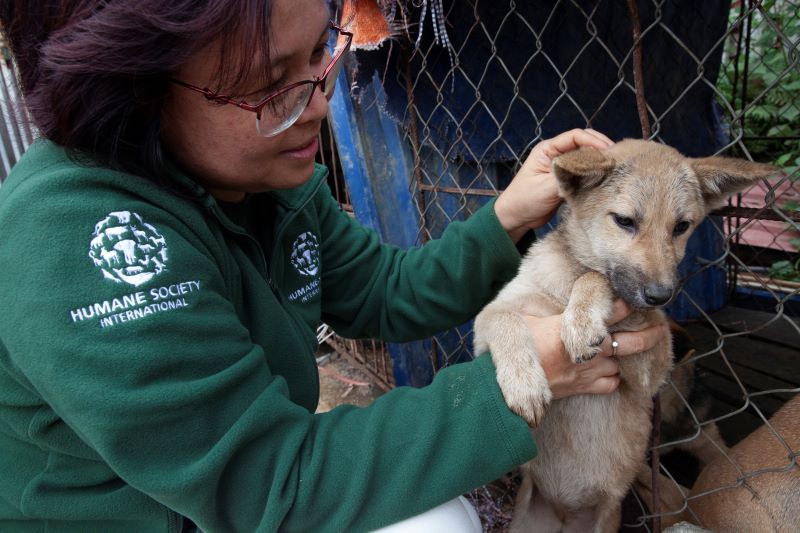
Cruel and dangerous trades
An estimated five million dogs and one million cats are caught, stolen, trafficked and slaughtered every year in Viet Nam to supply meat for human consumption. This trade involves immense animal cruelty and criminal activity. To catch dogs, traders use poisoned food baits, tasers and iron pincers while spring-loaded snares are used for cats. Animals are also snatched from people’s homes, as well as trafficked across the border from neighboring countries such as Cambodia and China.
During transport, the animals are tightly packed into small cages, loaded onto trucks and transported on arduous journeys, sometimes lasting several days. Throughout the journey, they are denied food, water or rest, and many die from suffocation, dehydration or heatstroke before reaching their final destination—a restaurant, market or slaughterhouse.
Not only is the trade in dogs immensely cruel, it poses a public health and safety risk, particularly due to its role in facilitating the transmission of the deadly rabies virus that still kills approximately 70 people each year in Viet Nam. The majority of human rabies cases in Viet Nam are linked to dog bites, with a significant number directly linked to the slaughter, butchering and even consumption of dogs. With vast numbers of dogs of unknown disease or vaccination status being trafficked across the country, the dog meat trade directly jeopardizes anti-rabies efforts and puts at risk the health and life of everyone connected with the trade.
Growing local opposition to the trades
Viet Nam is somewhat unusual in Asia in terms of the relative popularity of dog meat. In most countries across the continent where the trade exists, dog meat is only consumed by a small minority of the population, whereas the latest Nielsen opinion poll commissioned by HSI in September 2023 shows that dog meat is consumed by nearly 40% of the Vietnamese population, more popular than cat meat at 21%. It is most popular among men in northern Viet Nam. Cat meat dishes are particularly common around the capital, Hanoi, and in the northern province of Thai Binh.
Despite this, there is considerable and growing national support for a ban on the dog and cat meat trades in Viet Nam, particularly among young people and people who live in the south. Nationally, 64% and 68% of people, respectively, support a ban on dog meat consumption and the dog meat trade, and 71% of people support a ban on both cat meat consumption and trade. By far the top reasons for not consuming dog and cat meat are a belief that they are companion animals and an aversion to animal cruelty. Perhaps key to this sentiment is the growing pet owning population in Viet Nam, and indeed 87% of poll respondents had either directly or indirectly experienced the theft of a companion animal.
Our work
Humane Society International’s team in Viet Nam works throughout the country to tackle the dog and cat meat trades, calling for the strengthening of laws and regulations to prohibit the trades on grounds of animal welfare and public health and safety.
Our goal is a nationwide ban on the cruel trades in the slaughtering and consumption of dogs and cats. We are committed to raising the profile of the issue to both the government and public by highlighting the inherent animal cruelty, the illegality involved in the trades, the emotional toll on pet guardians, as well as the significant risk the trade poses to public health and safety. We are harnessing the voices of the ever-growing pet-owning and -loving society in Viet Nam to influence policy makers in favor of reform, while also working to end the demand, and, therefore, the supply, of dogs and cats.
We are also working with the authorities in two target provinces to launch programs to encourage responsible pet guardianship, increase pet sterilization and rabies vaccination coverage, promote compassion to all companion animals and support the enforcement of existing laws that are routinely flouted by traders and, thereby, disrupt their illegal operations. Our aim is for these programs to serve as models for other provinces and encourage national policy reform.
In addition, after many years of running our Models for Change program in South Korea, we launched this program in Viet Nam in 2022. We are working directly with traders and industry workers who are seeking to leave the cruel trades behind them and transition to alternative livelihoods. As well as rescuing dogs and cats where we can and ending the cycle of suffering for countless others, our Models for Change program is inspiring other traders to follow suit. At the same time, our program is helping to raise vital public and political awareness of—and opposition towards—the trades, and serve as a blueprint for authorities to follow.
Adoption
The dogs and cats we rescue from the meat trades in Viet Nam receive excellent veterinary care and rehabilitation at a specially designed shelter at our partner, Thai full health, the animals are made available for local adoption so that they can be cared for in safe and loving homes.
Humane Society International

WASHINGTON—This week, 34 dogs are arriving at Washington Dulles International Airport from South Korea where they were rescued from the dog meat industry by Humane Society International/Korea and its partners. Romeo, Nuri, Daisy, Phoenix, Brown Bear and the other dogs coming to the U.S. will be cared for at a care and rehabilitation center operated by HSI and the Humane Society of the United States. They will receive the love and comfort that the dog meat industry denied them, including beds, a nutritious diet, enrichment and veterinary care. Eventually they will be transferred to the HSUS’s shelter and rescue partners where they will be ready for adoption into loving homes.
Up to an estimated 1 million dogs a year are killed for meat in South Korea, intensively bred on farms where they are locked in barren, metal cages without water or proper food, living in squalid conditions, many suffering from malnutrition and painful skin and eye diseases. Most are brutally slaughtered at around one year of age, usually by electrocution.
Sangkyung Lee, dog meat campaigner for Humane Society International/Korea, said: “For these dogs flying to the United States, South Korea’s dog meat industry will soon be a distant memory. But hundreds of thousands of other dogs are still languishing in terrible conditions on dog meat farms for a meat that very few Koreans want to eat and most want banned. It’s now been one year since the South Korean government acknowledged the need for a dog meat task force, and we are still no closer to ending this cruel industry. The time for delay is over. We are urging relevant government ministries to proactively work towards ensuring the task force delivers a plan to end the suffering of all dogs living miserable lives on dog meat farms.”
Jeffrey Flocken, president of Humane Society International, said: “As a proud parent of a dog rescued in 2019 from the 15th farm Humane Society International helped transition out of dog meat industry, I know these dogs can become wonderful additions to a family. All these nearly three dozen dogs needed was the chance to be saved from the dog meat industry, and that was made possible by HSI’s fantastic teams and partners on-the-ground in South Korea and here in the United States.”
Kitty Block, president and CEO of the Humane Society of the United States and CEO of Humane Society International, said: “It is a testament to the professionalism and
effectiveness of our staff and animal advocate partners in South Korea that local authorities there are working more frequently with us to help coordinate care for dogs saved from the meat trade. As these rescued dogs arrive in the United States and move into our rehabilitation center, we look forward to the next chapter: preparing them to be adopted into loving homes where they can finally enjoy life as all dogs should.”
As these dogs start new lives, Humane Society International will continue to campaign for an end to the dog meat industry. Since 2015, HSI/Korea’s Models for Change program has helped dog farmers in South Korea transition to new, more humane and profitable livelihoods such as chili plant and parsley growing or water truck delivery. HSI/Korea has permanently closed 17 dog meat farms and rescued more than 2,500 dogs who find adoptive homes in the United States, Canada and the United Kingdom, with a small number rehomed in South Korea.
An opinion survey by Nielsen Korea published and commissioned by HSI/Korea in October this year, shows that 85% of Koreans say they have never eaten dog meat or will not do so in the future. In addition, 56% of people said they support a dog meat ban.
54% of Koreans in their 20s who ate dog meat, did so reluctantly under pressure from fathers and senior work colleagues
Humane Society International
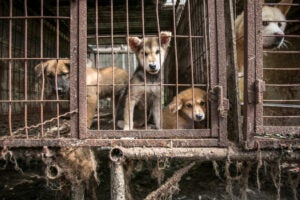
SEOUL, South Korea—More than half of South Koreans in their 20s who have consumed dog meat in the past year, felt social pressure to do so from influential seniors such as their father or senior colleagues at work, a new survey finds. While the majority of respondents in this age group did not consume dog meat, of those who did, 54% reported that they ate dog meat under pressure, rising to 57.4% in urban areas. Despite this, the survey found that nationwide refusal to eat dog meat is very high, with 87.5% of people saying they have never eaten it or will not do so in future and 56% supporting a ban.
Animal protection group Humane Society International/Korea which commissioned market research experts Nielson Korea to conduct the survey of 1,500 people from urban and rural areas, says young Koreans instinctively feel that eating dogs is wrong and they should feel empowered to say no in social situations. HSI/Korea says that pressure to eat dog meat from family or work seniors, means that more people—particularly in urban areas—are eating dog meat than actually want to, and the percentage of dog meat eaters would be considerably lower if more people felt free to exercise their individual choice.
Sangkyung Lee, Humane Society International/ Korea’s dog meat campaign manager, said: “Although it is clear that the vast majority of South Koreans don’t and won’t eat dog meat, it is nonetheless concerning that so many young Koreans feel pressured to eat it even though they don’t want to. The data shows that people in their 20s are more supportive of a dog meat ban than other age groups, and are more concerned about animal suffering and the lack of hygiene. Despite those concerns, more than half of respondents in this age group who did eat dog meat in the past year, say they felt pressured to do so. Pressuring people to eat dog meat needs to become socially unacceptable, and young Koreans like myself need to feel empowered to say no and stick to our principles. It’s ironic that while an individual’s right to choose is the top reason put forward by those who oppose a dog meat ban, our survey suggests that if social pressure were removed, even more people would exercise that choice by not eating dog meat at all.”
The main findings of the survey are that:
- 87.5% nationwide say they have not or will not consume dog meat in the future.
- 53.6% of Koreans in their 20s who ate dog meat in the past year, did so despite not wanting to.
- 29.2% nationwide were first introduced to dog meat by their father and 22% by their office senior.
- 63.7% nationwide say they are concerned about the welfare of dogs raised for meat.
- 53.1% nationwide believe dog meat is not safe and hygienic to consume.
- 56% nationwide support a dog meat ban.
- 64.1% of respondents nationwide who oppose a dog meat ban do so because they believe it should be an individual’s choice.
Earlier this month (Oct 7) at the National Assembly, Democratic Party Assembly member Jeoung-ae Han expressed her frustration that the Ministry of Food and Drug Safety isn’t doing enough to tackle the illegal and unhygienic dog meat industry. Han said: “According to the Food Sanitation Act, dog meat is not considered food therefore it is clear that dog meat trade is illegal. The current law states that the Ministry can crack down on dog slaughter, and dog meat processing, distribution and cooking because it is illegal. However, the Ministry does not do its work.” She went on to say, “it is threatening people’s health to turn a blind eye to unhygienically processed dog meat.”
A government taskforce was announced in November last year and established in December, to evaluate options for a dog meat ban. Despite surveys showing that the majority of Koreans would support a ban, the task force has twice delayed publishing its conclusions and has now been silent since June this year. HSI/Korea says the time for delay is over and urges President Yoon to help South Korea end the dog meat era forever.
JungAh Chae, executive director of HSI/Korea says: “The taskforce was originally set up because it was recognized that the time is right to ban dog meat. However, almost a year later, the taskforce has still not advanced any recommendations for how to implement a dog meat ban despite that outcome clearly being favoured by most Koreans. President Yoon is a dog owner himself, including of a rescued Jindo, a breed we typically find suffering on dog meat farms. We urge him to help make all Jindos just as lucky by ending South Korea’s dog meat era once and for all. By doing so we would join with others across Asia such as Hong Kong, Taiwan, Singapore and Thailand in consigning dog meat to the history books.”
Since 2015, HSI/Korea’s Models for Change program has helped dog farmers in South Korea transition to new, more humane and profitable livelihoods such as chili plant and parsley growing or water truck delivery. HSI/Korea has permanently closed 17 dog meat farms and rescued more than 2,500 dogs who find adoptive homes in the United States, Canada and the United Kingdom, with a small number rehomed in South Korea.
Download photos and video of an HSI/Korea dog meat farm rescue.
ENDS
Media contact: Wendy Higgins, director of international media: whiggins@hsi.org
Notes: The survey of 1,500 people from urban and rural areas was conducted online in August 2022 with a margin of error of +-2.53%.
Chinese police intercept 1,408 pet and stray dogs and cats in appalling conditions
Humane Society International / Global
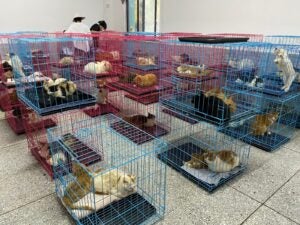
BEIJING—Chinese animal activists have released shocking footage of dead and dying dogs and cats on a truck crammed with 1,408 animals being trafficked for the meat trade in China. Three hundred and seventy dogs and cats perished on board, or shortly after removal from, what activists are calling the “death truck” which was stopped by police on the highway headed for slaughterhouses and markets in Yulin, in south China. The footage was released to global animal protection group Humane Society International which campaigns across Asia to end the dog and cat meat trades.
The truck was intercepted in Xian Tao city in central China’s Hubei province, half way along its intended 1,200km journey from Fucheng in the north to Yulin in the south. Rescuers from local animal groups converged at the scene, joined by Beijing-based dog meat campaign specialists from Capital Animal Welfare Association who were able to carefully unload the traumatised animals. Alongside the lifeless bodies of dead dogs and cats, they found animals suffering with open wounds, broken bones, respiratory disease and severe dehydration. The activists administered what emergency treatment they could on the roadside, temporarily transporting the dogs to a nearby school and the cats to a holding facility before local shelters could rally to collect them.
CAWA’s Hao Da-yue attended the scene and estimates that most of the 718 dogs were likely stolen pets, and the 690 cats were probably snatched from the streets. The surviving animals are now being cared for by staff at local shelters who are administering life-saving treatment. They fear that the animals have endured such an ordeal, more may yet succumb to their injuries and sickness. HSI is providing emergency funds to help some of the shelters caring for the animals.
Hao Da-yue said: “I’ve attended many rescues of dogs and cats from the meat trade, but never before have I encountered such a shocking scene. This was a death truck, crammed full with desperate, frightened, traumatized animals caged up with their dead and dying companions. The smell of death, diarrhoea and vomit was overwhelming, and the sound of the animals whimpering and crying for our attention, was just heartbreaking. I saw a number of dogs and cats die on the roadside despite desperate attempts to help them, there was nothing that could be done but hold them as they passed away. Activists worked with tears in their eyes, many clearly shocked by what they were witnessing. The world needs to see how these poor dogs and cats suffer for China’s meat trade. Such appalling cruelty brings shame on China and shame on the majority of Chinese people who want nothing to do with this despicable trade.”
Although China has no animal protection laws with which to prosecute the traders for cruelty, Chinese health and safety regulations do present an opportunity. The two truck drivers have been detained by police and reported to Xian Tao officials, and the trader who contracted them and accumulated the animals now faces investigation by the Agriculture Bureau and could face charges for transporting sick animals across provincial boundaries without legally-required quarantine papers.
Dr. Peter Li, Humane Society International’s China policy specialist, said: “I want to pay tribute to the dedication and bravery of Chinese animal activists who work so hard to help animals caught up in the dog and cat meat trades. Having been to dog and cat slaughterhouses and meat markets myself, I know first-hand how traumatising it is to see this scale of animal abuse, and yet they are committed to exposing this cruelty in the hope of ending the trade for good. It is a tragedy that so many of these poor animals died on this truck, and the suffering they all endured at the hands of the meat traders is unimaginable. Most people in China don’t support this trade and it doesn’t reflect modern Chinese society, but without robust animal protection laws in place, we will continue to see this terrible cruelty.”
Facts:
- The truck was intercepted by police on 1st October 2022.
- Most people in China don’t eat dogs and cats. In fact they are only eaten infrequently by a small percentage of the Chinese population. Even so, it is estimated that as many as four million cats a year could be killed for the meat trade.
- In 2020, two major cities in mainland China–Shenzhen and Zhuhai–banned the consumption of dog and cat meat, a decision polling of 378 million people in mainland China by news site com shows is supported by nearly 75% of Chinese citizens.
- In addition to Shenzhen and Zhuhai in mainland China, across Asia the trade in and slaughter, sale and consumption of dogs is banned or otherwise ended in Taiwan, Hong Kong, the Philippines, Thailand, Singapore, Siem Reap in Cambodia, and 19 jurisdictions across Indonesia. In South Korea a government-initiated task force is currently considering the issue of a ban. President Yoon Suk-yeol has stated he would not oppose a dog meat ban provided there is social consensus, and first lady Kim Keon-hee has spoken publicly of her desire for an end to dog meat consumption.
ENDS
Media contact: Wendy Higgins, Humane Society International director of international media: whiggins@hsi.org
Campaigners call for national ban on dog meat trade
Humane Society International
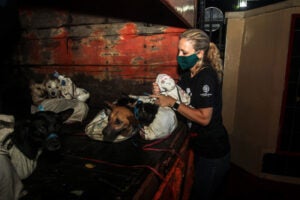
JAKARTA, Indonesia—Forty five dogs rescued from an illegal dog slaughterhouse have flown to North America to seek loving adoptive families. The dogs—including Sunshine, Oreo, Alice, Neo, Dave, Randy and Olive—were saved by police last November, with assistance from the Dog Meat Free Indonesia (DMFI) coalition which campaigns for a nationwide ban on the dog meat trade. DMFI rescuers discovered the dogs tied up in sacks on the back of a truck as it arrived at a notorious slaughterhouse that was reported to kill on average up to 30 dogs per day.
The 45 dogs—including puppies born to some of the dogs who were heavily pregnant when rescued—had been trafficked from West Java on a grueling 365-mile journey to Sukoharjo. Many of them had painful skin diseases at the time of rescue, and required treatment at DMFI’s shelter for shock, dehydration, malnutrition and deep wounds from the snares used to catch them. Once settled at Humane Society International’s care and rehabilitation centre in North America, they will be evaluated before being made available for adoption.
Bali-based Lola Webber, Humane Society International’s director of campaigns to End Dog Meat, was at the police interception to help rescue the dogs. Webber says: “Seeing the terrified and traumatized faces of these dogs huddled together at the slaughterhouse, is something that will stay with me for the rest of my life. They were skin and bones, dehydrated, weak and bewildered, suffering from profound trauma and horrific wounds from their capture. Now that they’ve recovered, flying them to North America will give them the best chance of a loving home where they will get to play with toys, sleep in soft beds and enjoy all the belly rubs they could they ever want. The dog meat trade has already been banned in 19 jurisdictions across Indonesia. I hope the government will take the next step of banning this awful trade for good so that no more dogs have to suffer this cruelty in future.”
Nationwide opinion polls from 2021 show that only a small minority of Indonesians (4.5%) consume dog meat, and 93% of all Indonesians support a ban on the dog meat trade. Despite this, conservative estimates suggest that more than one million dogs a year are stolen, trafficked, slaughtered and sold for human consumption. Many of them are pets snatched from their homes or the streets who are bludgeoned and bled to death at markets or slaughterhouses.
As well as being cruel, the dog meat trade jeopardizes Indonesia’s anti-rabies efforts and represents a substantial public health threat. Rabies is endemic across most of Indonesia, with only eight provinces holding rabies-free status. With dogs being routinely stolen from rabies positive areas and trafficked into rabies-free areas, the dog meat trade actively undermines attempts to control the deadly disease.
Karin Franken of Jakarta Animal Aid Network and national DMFI coordinator, said: “For the past ten months since their rescue, we’ve cared for these dogs at our shelter, healed their wounds and given them the love and care they needed to recover from their ordeal. The puppies born to dogs who were heavily pregnant when stolen for the meat trade, have only experienced human kindness, but the others have seen the very worst of humanity and it must have been extremely frightening. I’m thrilled that they will now be able to put all that trauma behind them and start new lives in loving, adoptive.”
Fifty-three dogs in total were rescued at the Sukoharjo interception which was conducted under COVID-19 health and safety restrictions, and a veterinarian was on site throughout. At the DMFI shelter the dogs received vaccinations against rabies, coronavirus, distemper and parvovirus. The dogs also underwent quarantine for more than 30 days, and received veterinary health checks in accordance with regulations prior to transport overseas. The remaining dogs will be open to local adoption and provided life-long care at the JAAN shelter as part of the shelter team family if needed.
Dog meat trade facts:
- Guruh Tri Susilo, the trucker driver, and Suseno, the slaughterhouse owner, were both found guilty of breaking Law 18 of 2009 chapter 89 regarding animal health and husbandry, and sentenced to 17 and 12 months in jail respectively. Suseno’s conviction marked only the country’s third conviction of a dog meat trafficker since the national government’s declaration in 2018 that “dogs are not food.”
- The dog meat trade is banned in 18 cities and regencies across Indonesia. The regencies are Karanganyar, Sukoharjo, Semarang, Blora, Brebes, Purbalingga, Mojokerto, Temanggung, Jepara and Magelang. The cities are Salatiga, Malang, Semarang, Magelang, Blitar, Mojokerto, Medan and Surabaya.
- In addition to the 18 locations in Indonesia, across Asia the trade in and slaughter, sale and consumption of dogs is also banned or otherwise ended in Taiwan, Hong Kong, the Philippines, Thailand and two major cities in mainland China. In South Korea a government-initiated task force is currently considering the issue of a ban. President Yoon Suk-yeol has stated he would not oppose a dog meat ban provided there is social consensus, and first lady Kim Keon-hee has spoken publicly of her desire for an end to dog meat consumption.
- The Dog Meat Free Indonesia campaign comprises local campaigners Jakarta Animal Aid Network and Animals Friends Jogja, and international groups Humane Society International, Four Paws and Animals Asia.
ENDS
Download photos and video of the dogs being prepared/ loaded at the shelter and at Jakarta airport
Photos and videos of the police interception and the dogs at the DMFI shelter
Media contacts:
Indonesia
- Lola Webber, Humane Society International’s End Dog Meat campaign director, and Dog Meat Free Indonesia international coordinator : Lwebber@hsi.org ; +6281337408768
- Karin Franken, Jakarta Animal Aid Network Founder, and national coordinator Dog Meat Free Indonesia Coalition : jaan_adopt@yahoo.com ; +6282122487794
United Kingdom
- Wendy Higgins, Humane Society International’s director of international media: whiggins@hsi.org
The dogs were due to be killed after local authorities closed the farm
Humane Society International

SEOUL—Twenty-one dogs left behind when authorities closed an illegal dog meat farm in Gyeonggi-do, South Korea, have been saved by animal groups just days before the start of Bok Nal—the three hottest days of summer during which most dogs on farms are sold and killed for dog meat soup, known as “bosintang.”
Humane Society International/Korea and Korean K9 Rescue saved the young dogs after Ansan city authorities shut down the facility for operating without a licence. The government officials removed 38 dogs to their shelter for rehoming but left 21 behind with a deadline for removal or they would be at risk of being euthanised or sold to a slaughterhouse. The farmer had been breeding dogs for human consumption at the site for six years.
The dogs—Romeo, Henry, Tori, Juliette, Brown Bear, Christian and all the others—will now receive veterinary care, vaccinations and undergo quarantine, before eventually being flown by HSI to North America to seek adoptive homes.
The rescue comes just days before South Korea’s first of three “Bok” days when dog meat consumption is most popular and the country’s usually low consumer demand increases. It is also the first Bok Nal since President Yoon Seok-yeol took office and comes as the government’s task force deliberating a nationwide dog meat ban has, for the second time, delayed announcing its recommendations for a phase out. President Yoon and first lady Kim Keon-hee—both of whom have voiced support for an end to dog meat—share their home with four dogs including Tori a rescued Jindo, a breed typically found on dog meat farms. The 21 dogs left on this illegal farm are Jindo crosses.
Sangkyung Lee, HSI/Korea’s dog meat campaign manager, said: “This dog farm is typical of so many across South Korea where thousands of dogs are languishing in filthy, deprived conditions, enduring the unimaginable frustration of being confined in tiny cages their whole lives until they are brutally killed by electrocution. Thankfully, we are able to bring a happy ending for these young dogs who will receive all the medical care and attention they need before flying to North America later in the year to seek adoptive homes. We urge President Yoon to ensure the national government immediately takes action to end the dog meat industry, so that no more dogs like these will have to endure this suffering for a food that most people in South Korea no longer wish to eat.”
The farmer, Mr Hwang, has signed a legally binding agreement never to farm dogs again. He said: “I make most of my money from doing handyman jobs, so that’s what I’ll continue to do now. When I took over the farm, the seller deceived me and my partner by telling us it would be a profitable business but it simply hasn’t been true.”
Gina Boehler, executive director of Korean K9 Rescue, said: “Korean K9 Rescue is happy to work in partnership with HSI in dismantling, and rescuing animals from, the Ansan dog meat farm. As the animals are suffering in the sweltering summer heat, we have moved quickly to remove them from an unbearable situation that no living being should endure. It’s important we keep pushing for reform and change to the agriculture laws within South Korea and effectively promote change from within. We are grateful for our collaboration with HSI and we know these dogs will go on to live a better life. We have seen and recognized the approval of most South Korean citizens who actively oppose the dog meat trade and lobby for change, which keeps our mission strong and alive.”
HSI/Korea, which has permanently closed down 17 dog meat farms in the country and assisted local groups and law enforcement in rescuing dogs from other farms and markets, campaigns for legislation in South Korea to end the dog meat industry. A recent opinion poll commissioned by HSI/Korea and conducted by Nielsen shows nearly 84% of South Koreans say they don’t or won’t eat dog, and almost 60% support a legislative ban.
Dog meat facts:
- Although most people in South Korea don’t eat dog, the belief that dog meat soup will cool the body and build stamina during the hot summer, particularly during Bok Nal season, still holds with some, especially the older generation.
- Since 2015, HSI/Korea’s Models for Change program has seen the organisation permanently close 17 dog meat farms, rescuing more than 2,500 dogs who find adoptive homes in the United States, Canada and the United Kingdom, with a small number rehomed in South Korea. The program also helps dog farmers transition to new, more humane, animal-free and profitable livelihoods such as chili plant and parsley growing or water truck delivery.
- Dog meat is banned (with varying degrees of enforcement) in Hong Kong, Taiwan, the Philippines, India, Thailand and Singapore, as well as the cities of Shenzhen and Zhuhai in mainland China, Siem Reap province in Cambodia, and in 17 cities and regencies across Indonesia.
- Despite these growing bans, an estimated 30 million dogs a year are still killed for meat across Asia.
- This rescue was conducted under careful health and safety restrictions, and all the dogs will receive veterinary care including tests for the presence of the H3N2 virus (“canine influenza”) as well as receiving rabies, distemper, hepatitis, parvo virus, parainfluenza and Leptospira vaccines. The dogs will be quarantined and health certified prior to transport overseas, in accordance with international export and import requirements.
Download photos and video of the rescue.
ENDS
Media contacts:
- United Kingdom: Wendy Higgins: whiggins@hsi.org, +44 (0)7989 972 423
- South Korea: Sangkyung Lee: slee@hsi.org
Nielsen online research conducted August/September 2020. Total sample size 1,000 people across six major cities in South Korea (Busan, Daegu, Incheon, Gwangju, Daejeon, Ulsan) weighted and representative of South Korean adults (aged 18+).
German shepherds, Labradors, huskies, golden retrievers among dogs found alive
Humane Society International / Global

As the infamous so-called dog meat “festival” ends in south China’s city of Yulin, some 1,000 miles away in Shanxi’s Fufeng County in north central China, 126 dogs have escaped a brutal death at the hands of dog meat traders thanks to a remarkable rescue operation by Chinese activists and local authorities.
In a show of unity to crack down on the dog meat trade, animal advocates from Vshine, local Xi’an activists, Baoji Small Animal Protection Association and a group of police, law enforcement officers and the mayor from Fufeng County worked together to close down an illegal dog slaughterhouse. Inside they found a gruesome scene with dead dogs on the floor, pools of blood, dehairing machines and knives. The activists also reported that processed dog meat was found at the facility. A pile of pet collars was found in the corner of the slaughterhouse, and some of the 126 dogs found alive were also wearing collars, disturbing proof that pet dogs—likely stolen from homes, streets and farms many miles away—are all too often being killed for meat.
Vshine released video and photos from the scene to its international partner, Humane Society International, which campaigns across Asia for an end to the dog meat trade. The shocking visuals show large and small dogs of all breeds including golden retrievers, German shepherds and huskies huddled together in the filthy slaughterhouse, many emaciated and panting. Despite their ordeal, many of the dogs were eager to receive reassurance and comfort from the activists who believe most of the dogs were once pets.
Ziyang Huang from Vshine told HSI: “This was an horrendous slaughterhouse and we are so grateful to the tip-off by the Xi’an activists so that we could rally together and get this place shut down before any more dogs suffered and died there. The dogs we found alive were whimpering and distressed but very happy to see us. They were standing in their own filth with blood and dog fur all around, and slaughter equipment just nearby. They will likely have witnessed dogs killed and butchered right in front of them. The amount of pet collars we found was really shocking, and the gentle, friendly nature of these dogs tells us probably most of them were once part of a home and somehow ended up at that terrible place. That’s just one of the reasons why we campaign to end this cruel dog meat trade.”
Animal campaigners from Vshine had just days before helped other activists rescue almost 400 dogs from a truck headed for Yulin that was intercepted by police. Once again, the operation saw China’s animal advocates working with the police to thwart the dog meat trade.
Dr Peter Li, China policy specialist for Humane Society International, which supports the care of dogs rescued from China’s meat trade and is providing funds to help care for many of the
126 dogs saved from the slaughterhouse, said: “This slaughterhouse rescue, and the truck interception before it, show the passion and determination of China’s animal advocates to end the brutal dog meat trade, and are great examples of how effective local police and law enforcement authorities can be when they crack down on this illegal activity. The agencies in Shanxi are to be applauded for acting so quickly and decisively to close this slaughterhouse and save the lives of the dogs. If all police across China followed their example, the dog thieves and traffickers would find it very hard to continue their illegal and dangerous activities. China’s growing pet loving population is increasingly calling for action, and this proof that once again beloved pet companions have fallen victim to the dog meat trade will surely renew calls for it to end.”
Facts about China’s dog meat trade:
- Most people in China don’t eat dog meat and it is not part of China’s mainstream culinary culture. There is significant Chinese opposition to the dog meat trade as concern for animal welfare grows.
- In 2020, China’s Ministry of Agriculture and Rural Affairs made an official statement that dogs are companion animals and not “livestock” for eating. That same year, two major cities in mainland China—Shenzhen and Zhuhai—banned the consumption of dog and cat meat, a decision polling showed was supported by nearly 75% of Chinese citizens.
- Dog meat is banned in Hong Kong, Taiwan, Thailand, Singapore and the Philippines, as well as in the cities of Shenzhen and Zhuhai in mainland China, Siem Reap province in Cambodia, and in 17 cities and regencies in Indonesia. An estimated 30 million dogs a year are still killed for meat in other parts of Asia.
Download photos and video of the Xi’an slaughterhouse
Download video of the truck interception
ENDS
Media Contacts: Wendy Higgins, HSI director of international media: whiggins@hsi.org
Summer solstice dog meat eating begins in Yulin
Humane Society International
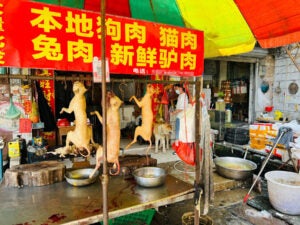
YULIN, China—With dog meat eating set to rise from tomorrow in the south China city of Yulin as the so-called Lychee and Dog Meat “Festival” gets under way, police in the city of Shaanxi together with activists campaigning for an end to the killing, have intercepted a dog truck headed for slaughter in Yulin, confiscating all 386 dogs on board. The truck with Yulin license plates was spotted on the highway about 500 miles from Yulin, crammed with cages of dogs. Video and photos taken by the activists and released to global animal protection group Humane Society International show the moment Shaanxi police pulled the truck over on the road, and distressing scenes of dogs crammed into small wire cages in the sweltering heat. The activists have praised Shaanxi police for their swift response and said that if all police took this zero tolerance approach, China’s brutal dog meat trade would come to an end.
Activists have also released new footage taken on 18 June at a dog meat market in Yulin city centre where market stalls can be seen piled with dog and cat carcasses.
Lin Xiong, one of the activists at the scene, told HSI: “It was horrifying to see so many dogs in such an appalling state, it was like a truck from hell for these poor animals. They had probably been on the truck for days, dehydrated and starving, many of them with visible signs of injury and disease. We could see their petrified faces peering out from the cages and we knew those dogs were headed straight for Yulin slaughterhouses where they would have been bludgeoned to death. The Shaanxi police response was really impressive, they came out in force and pulled the truck over, taking the dogs under police control when the driver was unable to prove he’d acquired and transported them legally. It was a very tense time for us but thanks to the authorities, these dogs are now safe in police quarantine where they can get food, water and rest. If only all police across China would have such a firm zero tolerance approach to these dog thieves and traffickers, it would be the end of the dog trade here. The dog meat slaughter brings shame on our country and so we will keep fighting until we see an end to this suffering.”
The dogs rescued by the activists were a mixture of breeds, with some still wearing their pet collars. Many appeared to be in poor physical health with infected eyes and skin disease. They have been moved to a police quarantine facility for 21 days where they will recover and receive veterinary care. After 21 days, if the trafficker refuses to pay a hefty fine (which they rarely do because the fine exceeds the profit they would make from selling the dogs), the dogs will be released to the activists. A shelter supported by Humane Society International and run by HSI’s partner group Vshine has made itself available to take care of as many dogs as needed.
Peter Li, Ph.D., China policy specialist for Humane Society International which supports the care of dogs rescued from China’s meat trade, said: “Despite the fact that most people in China don’t eat dogs, dog eating hotspots in the south such as Yulin do still exist and millions of dogs continue to suffer terribly. I’m so proud of the Chinese activists who are standing up for these animals, and the police whose response was absolutely vital, because without them these dogs would already be dead on the kill floor of a Yulin slaughterhouse. This video shows the efforts happening in China to stop this trade, and the passion of people who oppose the cruelty. As well as being an animal welfare nightmare, the Yulin gathering also flies in the face of China’s COVID-19 precautions and is largely fuelled by dog thieves, so there are compelling reasons for the authorities to really crack down on this trade. We very much hope that after the 21 days these rescued dogs will be handed over to the activists so that they can settle in at the HSI-supported shelter in north China and other rescue facilities. They are the lucky few.”
Launched in 2010 by dog meat traders to boost flagging sales, the Yulin event starts on June 21 and can attract thousands of visitors from across the province in southern China, who gather to eat dog meat stew and crispy dog meat at the city’s restaurants and stalls. In light of China’s COVID-19 precautions, Chinese animal activists have been urging Yulin authorities to stop the mass public gathering from going ahead, to protect public health and animal welfare.
Facts about China’s dog meat trade:
- Opinion polls show that most citizens of Yulin (72%) don’t regularly eat dog despite efforts by dog meat traders to promote it. Nationwide, there is significant Chinese opposition to the dog meat trade as concern for animal welfare grows.
- In 2020, China’s Ministry of Agriculture and Rural Affairs made an official statement that dogs are companion animals and not “livestock” for eating. That same year, two major cities in mainland China—Shenzhen and Zhuhai—banned the consumption of dog and cat meat, a decision polling showed was supported by nearly 75% of Chinese citizens.
- Summertime also sees an increase in dog meat eating in South Korea where dog meat soup or “bosintang” is often eaten by older citizens to beat the heat. Opinion polls show that the majority of Koreans (84%) either do not consume dog meat or don’t intend to in the future, and a government task force is currently debating the issue of a ban, with both President Yoon Suk-yeol and first lady Kim Keon-hee in favour of an end to the practice.
- Dog meat is banned in Hong Kong, Taiwan, Thailand, Singapore and the Philippines, as well as in the cities of Shenzhen and Zhuhai in mainland China, Siem Reap province in Cambodia, and in 17 cities and regencies in Indonesia. An estimated 30 million dogs a year are still killed for meat in other parts of Asia.
ENDS
Media Contacts: Wendy Higgins, HSI director of international media: whiggins@hsi.org
